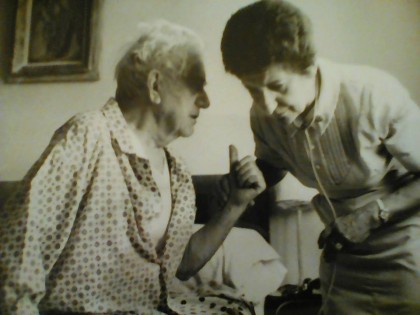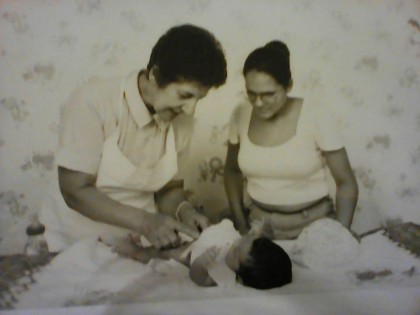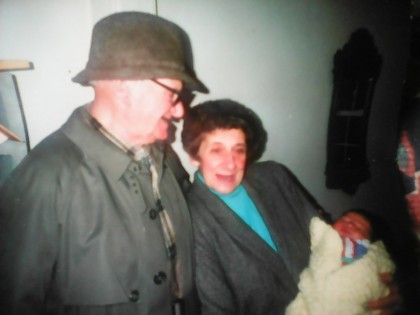Pro-Euthanasia “Caregivers”?
Devra Torres | Nov 15, 2017 | 2 cmts

Few things are more disconcerting than finding that your support group for people caring for Alzheimers sufferers is heavily pro-euthanasia. I'm staying in this (online) group, for various reasons (even though my mother is now in a faraway nursing home and I'm only her caregiver in the most remote kind of sense). It's full of useful information and opportunities to speak an encouraging word to people who have nowhere else to turn, but a friend and I are also hoping to start a new group for pro-life caregivers.
Still, it made me wonder: How could this be? What hope is there if the very people who are supposed to be caring for the vulnerable to the bitter end are falling for "death with dignity" propaganda? And I've come to think it's less surprising, and perhaps less ominous, than it seems at first. Let me explain.
For one thing, very few of them seem focused on euthanasia for their own loved ones--it's themselves they're thinking of. They're determined not to put anybody else, especially their own children, through the long-drawn-out nightmare many of them are enduring. They have, besides, a thousand-percent more lucid idea than most of us about just what-all caring for someone with dementia at the end of life entails, and they're not susceptible to sentimentalism. Well-meaning platitudes from the lips of people who have no bitter experience themselves carry no weight for them.
Besides, this online support group, like most, represents simply a cross-section of the population--guided largely by pop culture, pop psychology, and pop spirituality. (As I've written here, there are more grains of truth in such sources than I used to realize, but there's plenty of banality and incoherence, too!) There are certainly more prayer requests than you'd usually run into in a random cross-section, but that may stem more from desperation than from traditional morality.
You might expect an outsized proportion of compassionate altruists--after all, those who are avoiding caring for the infirm, as well as those who don't even have such a thing on their radar, have self-selected out. On the other hand, no matter how compassionate somebody is, if there's a void, or a caricature, where their moral formation ought to be, that compassion is more likely to express itself in euthanasia advocacy than in the spontaneous embrace of a life-affirming ethic.
The members of this group are mostly devoting 24 hours a day to their relatives, through a haze of anxiety and sleep deprivation, with no hope of a cure, an improvement, or an hour's break. When they confront the specter of euthanasia, they're doing so with the tools they have on hand--the assumptions they've taken in by osmosis for four or five or six decades, which are generally:
- Self-sufficiency and control = dignity
- Suffering is the worst evil and cannot coexist with dignity.
- It's bad taste to talk about killing instead of "death with dignity," "aid in dying," or "assisted suicide."
- Where euthanasia is illegal, it shouldn't be attempted. If you want to move to where it's legal, though, or if you long for it to become legal, that's fine.
- Insisting on extraordinary means to prolong the dying process and actively "putting the patient out of her misery" are one and the same. People who object to these are either overly religious or understandably but misguidedly unwilling to "let go," to the detriment of the sufferer.
- There's such a thing as "legal safeguards" and "stringent regulations," which will prevent a slippery slope.
A good number of members do have some sort of faith: some instinct which tells them that since "the Lord giveth," it's up to Him to arrange about the "taketh away" part also. Usually, this is expressed apologetically, as in, "I understand how you feel; I know it seems awful and irrational, but because of my faith I just believe we should leave it up to God." This kind of thing reinforces prejudice.

I once knew a lady, an RN, who pretty much accepted all the usual assumptions. She wasn't Catholic at the time, but at my mother's urging she read the relevant Church teaching and was impressed by the compassion and the nuanced distinctions between actively killing, refusing to prolong the dying process, and allowing a fitting level of pain control even if it shortened life as a side effect. Not surprisingly, she also changed her mind about abortion. She'd been pro-choice because of the suffering she'd witnessed as a visiting nurse, but she had the integrity to change her mind when ultrasound technology made the truth undeniable.
That was my Nana, about whom more here and here. I'm not saying she's typical: she certainly wasn't. Nor am I denying that we're proceeding down the slippery slope at breakneck speed. If you have a loved one in any kind of institution, or under the protection of even the most well-meaning caregiver, please be vigilant! But as we contend against the evil of killing the helpless, we need to "translate" our arguments into a language that can be heard by the ones we're talking to. And we need to fight for the dignity of the patient without leaping to conclusions about the motivations of the ones who swallow the poisonous propaganda.

--------------------------------
Photos are from my personal collection. The first two show Thelma Oguss (Nana), my maternal grandmother, working as a visiting nurse in Brooklyn, NY. The third shows her with my grandfather and my firstborn daughter. Nana died of Alzheimer's on All Saints Day in 2008.

Comments (2)
Katie van Schaijik
Nov 17, 2017 9:45am
Thank you for this post, too, Devra!
I did some volunteering with hospice a few years back and had a similar experience. It was disconcerting to discover how many of these people, who were dedicating themselves so unstintingly to caring for the dying, supported euthanasia.
I'm admirer of the philosophy of hospice, but one of its tenets bothered me: a patient has a right to die without pain.
That seemed to me to take things too far.
But the experience, together with my experience of Dutch people, who for the most part support assisted suicide as a matter of course, has definitely changed my perspective on the debate.
I understand now how and why pro-lifers can often come across as hard and doctrinaire and "forcing their religion" on others. I understand better, too, the need for us as a church to develop a better overall philosophy of care for the dying. For instance, we have to stop acting and reacting like every concern about excessive medical intervention to prolong life is a manifestation of the "culture of death."
Katie van Schaijik
Nov 17, 2017 9:54am
Pete Colosi is doing some great work in this area, imo.
I noticed the Pope, too, has recently given some attention to the issue of "overzealous interventions".
We can find some common ground with end-of-life carers who typically support euthanasia by recognizing that there IS such a thing as overzealous medical intervention. There ARE ways of "extending life" that don't serve the good of the person, and we do well to cultivate in ourselves—as Pete puts it—"the peaceful acceptance of the presence of death."